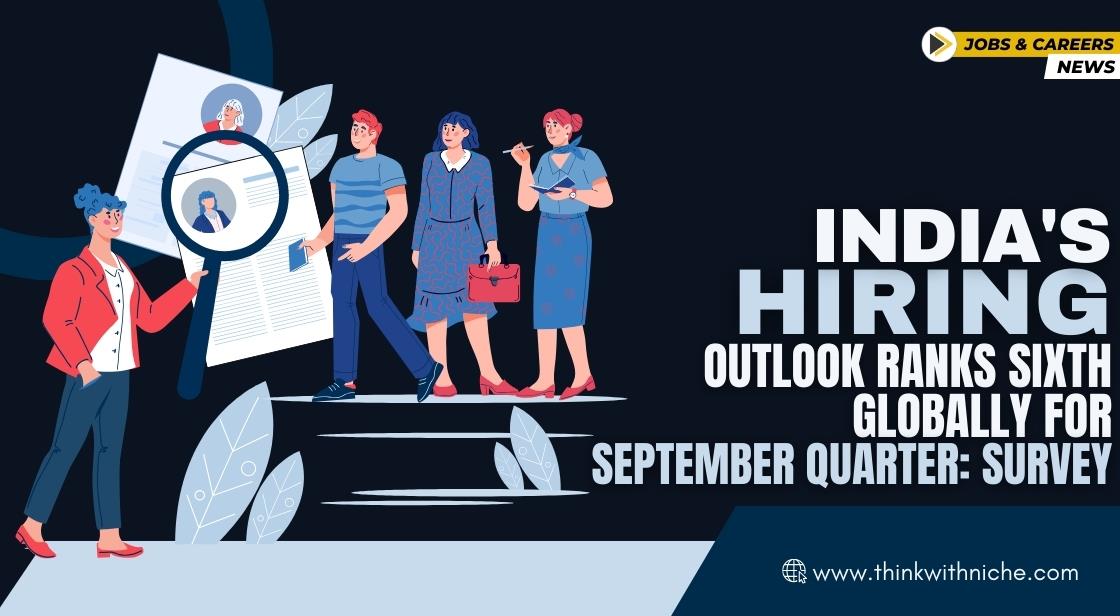India's Hiring Outlook Ranks Sixth Globally for September Quarter: Survey

News Synopsis
A recent ManpowerGroup Employment Outlook Survey reveals a cautiously optimistic outlook for India's job market in the third quarter of 2024. While India maintains a positive ranking (6th globally) with 30% of businesses planning to hire, this figure represents a 6% decrease compared to the previous quarter and the same period last year. This cautiousness can be attributed to two key factors:
-
Global Economic Slowdown: The slowdown impacting the global economy has particularly affected India's IT sector, a major source of employment. Companies are adopting a wait-and-see approach before expanding their workforces.
-
Upcoming General Elections: Political uncertainty surrounding the upcoming general elections in India is also prompting employers to exercise caution in their hiring decisions.
Regional Variations and Real Estate Boom:
Despite the national trend, India boasts the strongest hiring outlook within the Asia Pacific region, surpassing China (28%). This indicates a potential for continued job growth within the country. Regionally, North India leads with a hiring intention of 36%, followed by West (31%), South (30%), and East (21%). Interestingly, the real estate sector has witnessed a surge in investor interest, potentially fueling job growth in construction, property management, and related fields in the coming months.
AI and the Skills Gap Challenge:
The ManpowerGroup Employment Outlook survey highlights a concerning skills gap in the Indian workforce. Sandeep Gulati, ManpowerGroup's India Managing Director, emphasizes the need for long-term talent planning and strategic skill development programs to bridge this gap. Employers are increasingly adopting AI technologies, with over 62% incorporating tools like generative conversational AI.
However, a disparity in perception exists. While 80% of senior leadership teams believe AI will positively impact businesses, only 68% of frontline and factory workers share this sentiment. This highlights the importance of addressing potential anxieties and effectively training the workforce to adapt to the changing technological landscape.
AI and Job Creation: A Potential Silver Lining
Contrary to popular fears about AI replacing human jobs, the survey suggests that AI adoption might actually lead to job creation in specific sectors. Over the next two years, nearly 68% of employers anticipate an increase in headcount due to AI and Machine Learning implementation. The sectors expected to benefit the most from this trend include:
-
Communication services
-
Financial and real estate
-
Industrial and material sectors
-
Information technology
These sectors are likely to see a rise in demand for professionals with skills in data analysis, AI implementation, and human-machine collaboration.
Hiring Trends by Industry Size and Sector:
The survey also reveals variations in hiring intentions based on company size. Large organizations (1,000-4,999 employees) show the strongest optimism with a Net Employment Outlook (NEO) of 42%. This is followed by small (50-249 employees) and medium-sized companies (250-999 employees) at 34%, and large enterprises at 30%. Sector-wise, financials and real estate, along with healthcare and life sciences, exhibit the most robust hiring intentions. Conversely, communication services, transportation, logistics, and automotive sectors currently hold the weakest outlooks.
Looking Ahead: Embracing Change and Addressing Challenges
India's job market presents a complex picture, balancing optimism with caution. While global headwinds and upcoming elections create uncertainty, the real estate boom and potential for AI-driven job creation offer promising signs. To capitalize on these opportunities, India must address the skills gap and equip its workforce with the necessary capabilities to thrive in the evolving technological landscape.
By fostering a culture of innovation and adaptation, India can navigate these uncertainties and position itself for sustainable job growth in the years to come.
Conclusion
India's strong hiring outlook for the September quarter of 2024 underscores the resilience of its labor market despite global economic challenges and political uncertainties. As businesses continue to adapt to new technologies and market conditions, strategic talent planning and the adoption of AI will play crucial roles in shaping the future workforce.
You May Like









